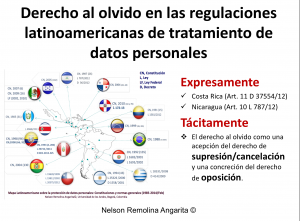 By: Nelson Remolina Angarita (13/XII/2016 ). [email protected]
By: Nelson Remolina Angarita (13/XII/2016 ). [email protected]
** Text translated from Spanish to English by Luisa Ricaurte Espinosa, GECTI.
The basis, definition and scope of the right to be forgotten will depend on what the regulations and jurisprudential interpretations say, or on the decisions or pronouncements of the authorities of each country. To date, we find that this right was expressly incorporated and since 2012 in Latin American countries (Nicaragua and Costa Rica) and later in Europe (2016). These normative references are initial referents of the subject. The analysis in each country will depend on its legal framework. Therefore, it is not sensible to generalize the subject in abstract terms, but to specify it in the light of the regulations of each State.
Article 10 of Law 787 of 2012 of the Republic of Nicaragua is entitled “Derecho al olvido digital” (right to be digitally forgotten) and its content is as follows: “The holder of the data has the right to request social networks, browsers and servers to delete and cancel personal data that are in their files. In the cases of data files of public and private institutions that offer goods and services and that for contractual reasons collect personal data, once the contractual relationship has been terminated, the owner of the data can request that all personal information registered while being a user of a service or buyer of a good, be removed and canceled”.
As observed, the right to be forgotten is treated as a synonymous of the right of cancellation or suppression, that are part of the ARCO rights, which are expressly mentioned in some Latin American regulations, such as the Mexican one. Notice how the first paragraph does not specify the reasons or circumstances in which the right to be forgotten proceeds regarding social networks, browsers and servers. Hence, they will be the same to request the deletion or cancellation of the data. In the case of the existence of a contractual relationship with public and private institutions, the right to be forgotten can be exercised when such relationship ends.
Article 11 of Decree 37554 of 2012 of the Republic of Costa Rica under the title of “right to be forgotten” states: “The preservation of personal data, which may affect its owner, shall not exceed ten years, from the occurrence of the recorded events, unless there is a special rule that establishes another term or because the agreement of the parties has established a shorter term. When its preservation is necessary, beyond the stipulated period, the personal data must be disassociated from its owner “. This article connects the right to be forgotten with the existence of personal data whose information may affect it. For this purpose, it establishes a predetermined and objective time period as a reference point.

